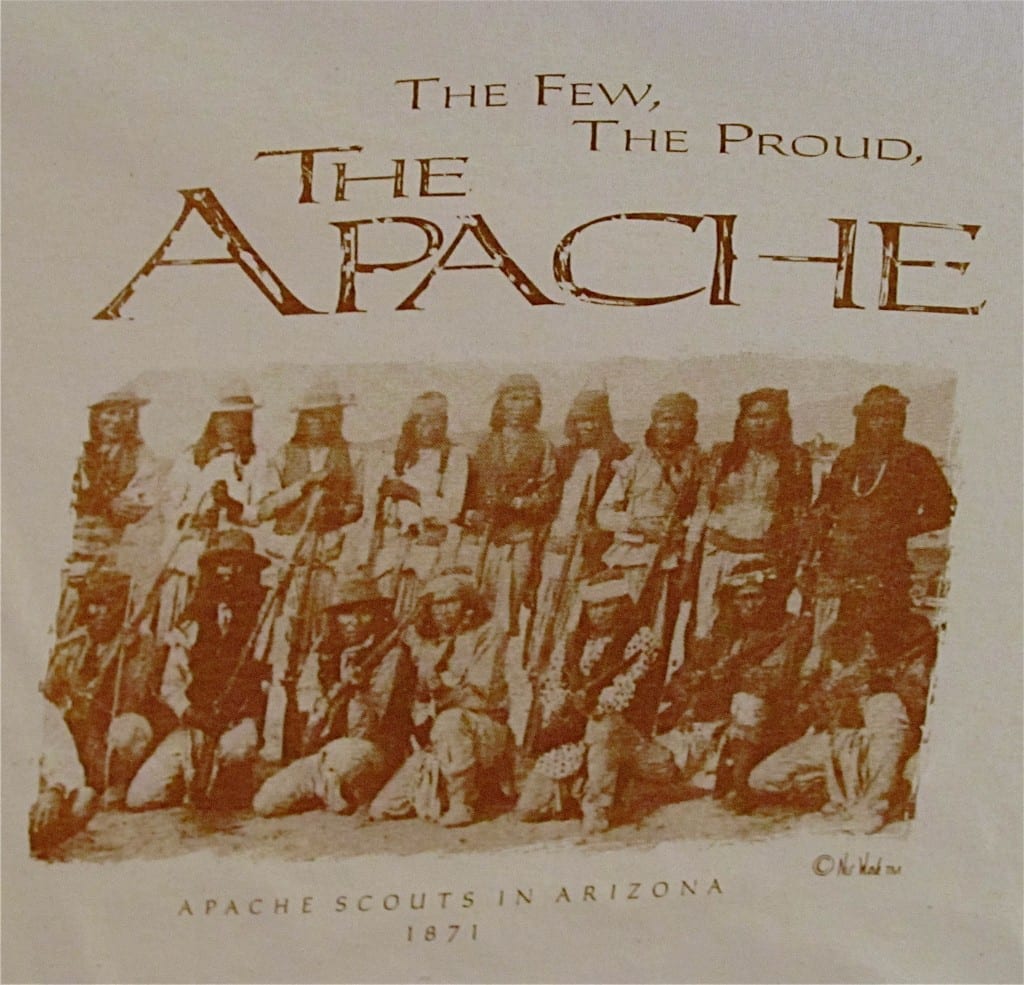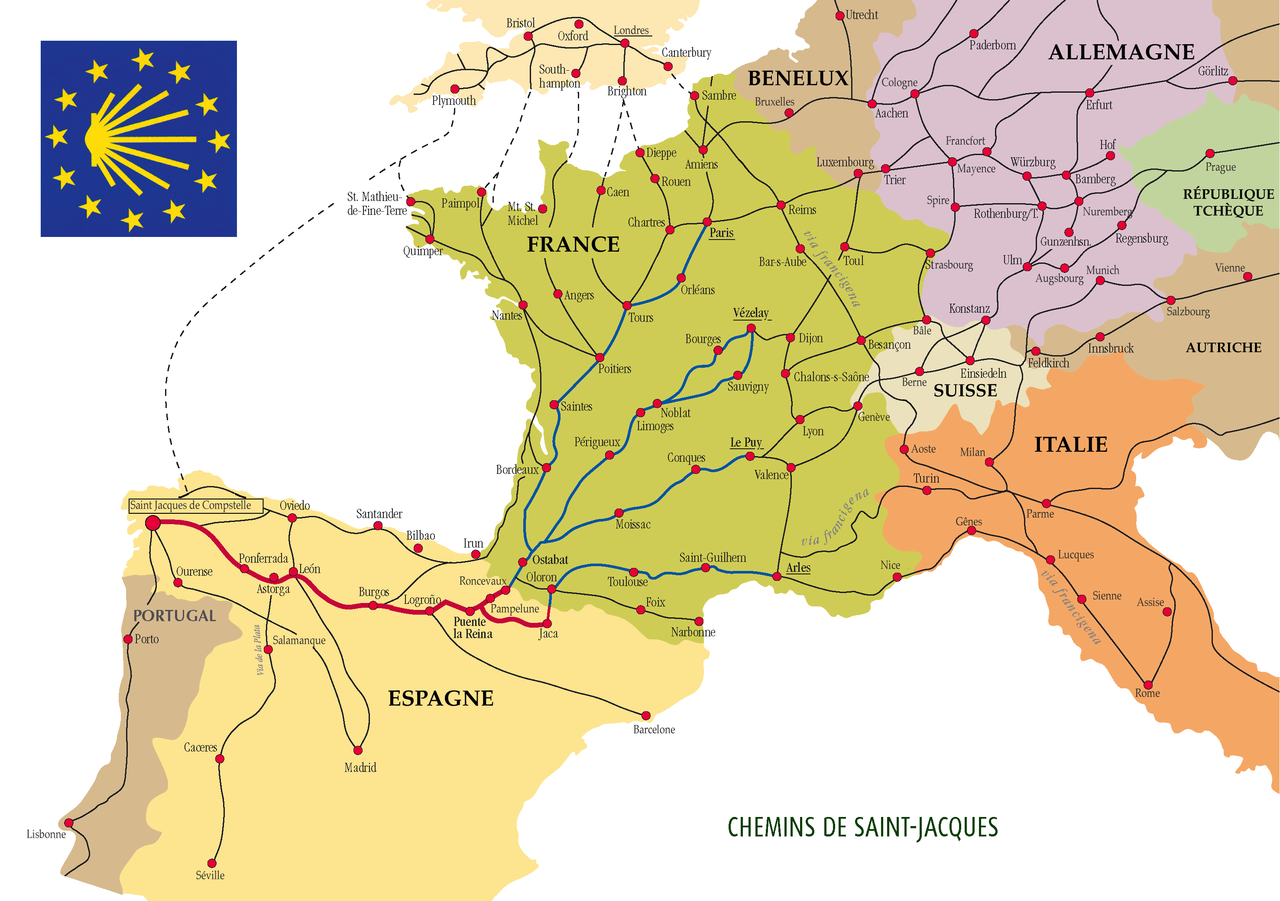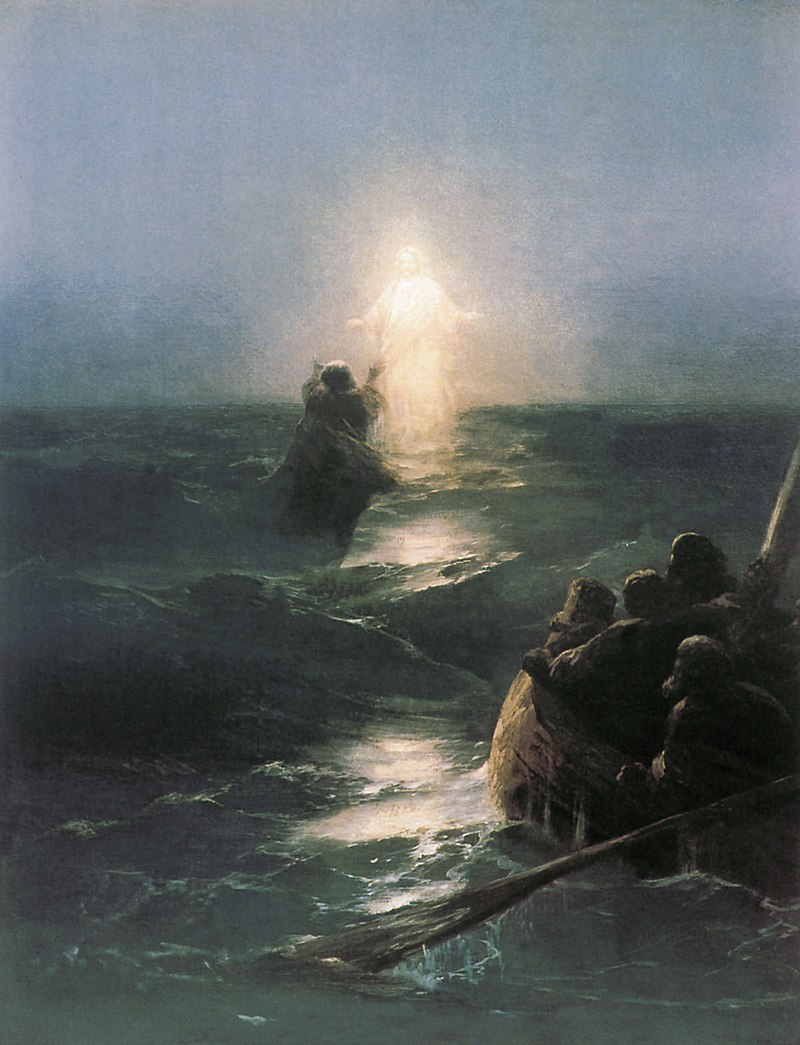
An early variation – of many more to come – on the meme proclaiming “the few, the proud…”
* * * *
In the last post – Wedding in Hadley – and John, Peter and Paul – I talked about returning from three weeks in Israel at the end of May. Then – two weeks later – about making the transition from an 11-hour flight from Israel (and 26 hours without sleep) to getting ready for an 1,100 mile road trip up to Hadley, MA. (To see my “favorite niece from Utah” get married.)
 Now I’m back – and don’t have to worry about any more traveling. That is, not until the end of August, when I fly to Lisbon to hike the Portuguese Camino. (From Porto to Santiago de Compostela, as shown at right.)
Now I’m back – and don’t have to worry about any more traveling. That is, not until the end of August, when I fly to Lisbon to hike the Portuguese Camino. (From Porto to Santiago de Compostela, as shown at right.)
Until then I can get back to meditating on the Daily Office Readings. And I’ll start with the Gospel for last Sunday, June 7, which includes this, from Matthew 22:14:
“For many are called, but few are chosen…”
Mainly because that passage ties in with a theory I talked about last May 2d: That of the “many” who call themselves Christian, only a “few” avoid the trap of turning too conservative.
I used as an example the Apostle Peter, when Jesus walked on water. It turned out that Peter was the only disciple who actually got his butt out of the boat and tried walking on water himself. Meanwhile, the “conservative” disciples stayed safe and sound back in the boat:
Peter walking on the water is a prime example of one Christian – out of ten* – taking the more-difficult “spiritual path.” The other nine or so “conservatives” took the safer, the easier, the more literal path of following Jesus.
Of course Peter fell flat on his face. But in so doing he tested – and strengthened – his faith in Jesus. See Easter, Doubting Thomas Sunday – and a Metaphor. Again, that “metaphor” was based on the story of Jesus walking on water (shown below left), which in turn was based on Matthew 14. (Starting at verse 22.) The “high point” came at Matthew 14:29, when Jesus bid Peter to also “walk on water,” which he did. (For awhile anyway.)
That is, if only for one brief shining moment, Peter walked on water himself. Unfortunately he ended up panicking and falling flat on his face, but at least he tried!
 Which to me illustrates the difference between a real Christian – like Peter – perfectly willing to fall on his face in an effort to emulate Jesus and His path, and the other disciples. Those who stayed safe and sound in the boat, and represent the “many who are called,” but end up turning down Jesus’ invitation to both “live abundantly and do greater miracles” than He did.
Which to me illustrates the difference between a real Christian – like Peter – perfectly willing to fall on his face in an effort to emulate Jesus and His path, and the other disciples. Those who stayed safe and sound in the boat, and represent the “many who are called,” but end up turning down Jesus’ invitation to both “live abundantly and do greater miracles” than He did.
Unfortunately, those “too-conservative Christians” seem to represent the vast majority of all who call themselves Christian today. (At least in this country, and possibly up to 90 percent.) But aside from short-changing themselves – they get half or less of what they could from the Bible – they’re both giving the rest of us a bad name and driving away potential new converts “in droves.”
For more on this passage see Matthew 22:14 Commentaries (Bible Hub). The commentaries first note this passage is mirrored in Matthew 7:13-14: “Enter through the narrow gate. For wide is the gate and broad is the road that leads to destruction, and many enter through it. But small is the gate and narrow the road that leads to life, and only a few find it.” Also Matthew 20:16: “So the last shall be first, and the first last: for many be called, but few chosen.”
The commentaries also noted the “‘chosen’ are those who both accept the invitation and comply with its condition.” Or conditions, including Paul’s caution that following the letter of the Gospel “gives death,” while only the law’s spirit gives life. (2d Corinthians 3:6.)
And that Jesus expects we Christians to eventually do even greater miracles than He did. And that we can only do by reading the Bible with an open mind. (Luke 24:45.)
See also Jesus to His followers: “Don’t get TOO conservative!” Among other things, that post noted that in His Sermon on the Mount, Jesus might add, ‘Go beyond the “fundamentals.’” It also cited the web post How narrow is the narrow gate? – GotQuestions.org.
The gist … is that “many will follow the broad road.” And that’s what we have in America today. The “many” are following the broad road of so-called “Conservative Christianity.” (Which to me is a classic oxymoron, or more precisely, a contradiction in terms.)
That is, staying a “conservative Christian” – after boot-camp – means taking the easy way, because it’s so much easier to be a “literalist.” You don’t have to think, you don’t have to take chances – like Peter did when he tried to walk on water – and you never have to worry about falling on your face. But in plain words you also never truly “live” as a Christian, and you will certainly never, ever get to the point where you can perform greater miracles than Jesus.
“You want proof? Check out the Wikipedia article on the Beatitudes:”
Each Beatitude consists of two phrases: the condition and the result. In almost every case the condition is from familiar Old Testament context, but Jesus teaches a new interpretation…
In other words, if Jesus had been a conservative, we would never have the Beatitudes. (See again, On Easter, Doubting Thomas Sunday – and a Metaphor.) Or Christianity itself…
And finally, see John 4:24: “God is spirit, and his worshipers must worship in the Spirit and in truth.” Further, Ellicott’s Commentary for English Readers added in turn – of God – that “His will has been expressed in the seeking. But His very nature and essence is spirit, and it follows from this that all true worship must be spiritual.”
Which presents the challenge of being both highly spiritual and a devoted soldier in the “Army of Christ.” (One benefit of which: “As a good soldier in the Army of Christ, you do have the career option of expanding your horizons, and/or testing your limits.” Just like Peter did.)
Which brings up Psalm 144:1. Wikipedia said the Latin translation of 144:1 was influential in Western Christianity in the Middle Ages. “With the development of the ideal of the knighthood in the 12th century, the verse came to be seen as a fitting prayer for the Christian warrior.”
It seems that “Great Minds Think Alike…”
* * * *

From “the few the proud” … the Soldiers (or Marines) of Christ.
* * * *
The upper image is courtesy of The Few Proud – Image Results, as distinct from The Few The Proud Marines – Image Results, from which I gleaned the lower image. (For more on Apache Scouts, check the “meme” indent below.) Other variations on the meme included “the few, the proud, the insane,” “the few, the proud, the emotional,” “the few, the proud, the trombones,” “the few, the proud, the” various family names, and “the few, the proud, the American coal miner,” not to mention “the few, the proud, the Braves,” shown below left. For more on the Marine Corps version, see also Culture of the United States Marine Corps – Wikipedia, Marines are once again ‘The Few, The Proud,’ and Marine Corps may replace ‘The Few, The Proud’ as its recruiting slogan.”

Also note an internet meme – itself a variation of a plain old “meme” – is an activity, concept, catchphrase, or piece of media that spreads, often as mimicry or for humorous purposes, from person to person via the Internet. See Wikipedia, which added:
The word meme was coined by Richard Dawkins in his 1976 book The Selfish Gene as an attempt to explain the way cultural information spreads[, while] the concept of the Internet meme was first proposed by Mike Godwin in the June 1993 issue of Wired. In 2013, Dawkins characterized an Internet meme as being a meme deliberately altered by human creativity… Dawkins explained that Internet memes are thus a “hijacking of the original idea,” the very idea of a meme having mutated and evolved in this new direction. Furthermore, Internet memes carry an additional property that ordinary memes do not: Internet memes leave a footprint in the media through which they propagate (for example, social networks) that renders them traceable and analyzable
Re: Apache Scouts. They were “part of the United States Army Indian Scouts. Most of their service was during the Apache Wars, between 1849 and 1886, though the last scout retired in 1947. [They] were the eyes and ears of the United States military and sometimes the cultural translators for the various Apache bands and the Americans. Apache scouts also served in the Navajo War, the Yavapai War, the Mexican Border War and they saw stateside duty during World War II.” See Wikipedia. But see also Apache Prisoners of War | Native American Netroots, for a description of what happened to Apache prisoners, including those who “scouted” for the Army:
Chatto and about a dozen other Chiricahua Apache who had served as scouts for the army were summoned to Washington where they met with the Secretary of the Interior. During their return trip to Arizona, their train was suddenly turned around and they were taken to Fort Leavenworth, Kansas where they were held as prisoners… 383 men, women, and children, were taken by train from Arizona to their prison in Florida. All of the windows in the train were closed and nailed shut. They were given buckets and cans to serve as chamber pots… Overall, the stench in the train cars was unbearable.
Re: “One disciple out of ten.” I assume there were 11 other disciples in the boat, along with Peter, but that can’t be proven. I Googled “how many disciples were in the boat when Jesus walked on water,” and got conflicting answers. Most said the Bible doesn’t say, while a few say “there were 12.” (The Aivazovsky painting only shows four.) But for purposes of “dumbing it down,” like Moses and Jesus, I’ve said Peter was “one of ten” in the boat. That way we can come up with the easily-understood figure of Peter representing the 10% of “real” Christians who follow the “spiritual path.” (And of the “too-literal, too-conservatives” constituting up to 90% of those calling themselves Christian.)
Re: The Portuguese Camino, from Porto to Santiago de Compostela. The map is from the Wikipedia article on Santiago de Compostela, showing Porto on the lower left. My first Camino hike – in 2017 – started in Pamplona, near the border with France, spelled on the map as “Pampelune.” For more on the “hike and bike” see “Hola! Buen Camino!!” And also, from my companion blog, “Hola! Buen Camino!” – Revisited, and “Buen Camino!” – The Good Parts.
The full Daily Office Readings for Sunday, July 7, 2019: “AM Psalm 146, 147; PM Psalm 111, 112, 113[;] 1 Samuel 14:36-45; Rom[ans] 5:1-11; Matt[hew] 22:1-14.”
Other thoughts from the commentaries for Matthew 22:14:
They were careless. Multitudes perish for ever through mere carelessness, who show no direct aversion, but are careless as to their souls. Also the business and profit of worldly employments hinder many in closing with the Savior.
Also, “The day is coming, when hypocrites will be called to account for all their presumptuous intruding into gospel ordinances, and usurpation of gospel privileges.” Which adds up to what Sirach 5:5 says, “Do not be so confident of forgiveness that you add sin to sin.” See also Wikipedia, which notes the Bible book Wisdom of Sirach – also called the Book of Ecclesiasticus (not Ecclesiastes) – “is a work of ethical teachings, from approximately 200 to 175 BCE, written by the Jewish scribe Ben Sira of Jerusalem… Sirach is accepted as part of the Christian biblical canons by Catholics, Eastern Orthodox, and most of Oriental Orthodox. The Anglican Church does not accept Sirach as proto-canonical, and says it should be read only ‘for example of life and instruction of manners…'”
Re: Jesus walking on water. Note that in the painting by Ivan Aivazovsky (1888), Peter has “walked” quite a distance from the safety of the boat, over some very choppy waves, and in fact seems much closer to Jesus than to the safety of the boat, where the “other” disciples sit and watch…
Re: “A soldier of Christ.” See On Garritroopers and REAL soldiers – in the “Army of Christ,” and/or A Soldier of Christ – “and BEYOND!”
The lower image is courtesy of The Few The Proud Marines – Image Results.